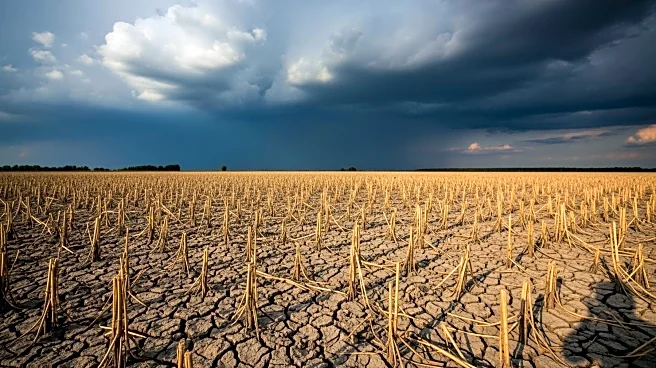What's Happening?
Pakistan's agricultural sector is facing severe challenges due to climate change, impacting wheat and rice production. Rising temperatures, erratic rainfall, and extreme weather events are destabilizing local livelihoods and affecting global commodity markets. Wheat production in Punjab has declined significantly, with projections of further decreases if adaptation measures are not implemented. Rice yields are also threatened by temperature fluctuations and excessive rainfall. The 2022 floods exemplified the devastating impact of climate disasters on agriculture, causing significant economic damage.
Why It's Important?
The agricultural disruptions in Pakistan have broader implications for global commodity markets. Pakistan's reliance on Russian wheat imports highlights its vulnerability to geopolitical and climatic shocks. The Russia-Ukraine war has exacerbated these challenges, leading to increased global wheat prices. For rice, Pakistan's export ambitions face obstacles due to climate-driven yield volatility and competition from other countries. The situation underscores the need for climate-resilient infrastructure and agri-tech innovations to mitigate risks and enhance food security.
What's Next?
Pakistan's government is focusing on climate-resilient infrastructure and agri-tech to address these challenges. The push for renewable energy and projects like the Sindh Flood Emergency Rehabilitation Project demonstrate efforts to mitigate climate risks. Innovations such as Punjab's Smart Basmati Program and solar-powered pack houses in horticulture are improving yields and export competitiveness. These initiatives offer investment opportunities in climate-resilient infrastructure, which could help stabilize the agricultural sector and support economic growth.
Beyond the Headlines
Pakistan's climate vulnerabilities are reflected in its ESG ratings, highlighting the need for companies to integrate climate resilience into their strategies. Underinvestment in adaptation could lead to systemic shocks, affecting food security and economic stability. The agricultural crisis in Pakistan serves as a microcosm of broader challenges facing climate-vulnerable emerging markets. Investors must align their portfolios with the realities of climate change to mitigate risks and capitalize on opportunities in climate-resilient infrastructure.









